Them two dogs

I am asked where I am headed. The expression in the lady's eyes suggests this is not the first time I was asked the question. I stand there, wondering if the pits around her eyes—white as the sun—are caused by the likes of me, and I tell her where I'm headed. She hands me the ticket printed on cheap, rough paper. There's a wind from far away, threatening to blow away the small paper in my hand, but I hold tight. The gust beats against my shirt, and my face feels caked with red sand. I am reminded of some time in the middle of a wet summer a decade ago.
Outside, rain had left the grey concrete land crying. I was busy peering at a man pulling a rickshaw in water that climbed up to his knees and then some. Against the dreary concrete, the colours of the rickshaw were too bright— almost an aberration. I stared, enamoured, not paying attention to the commotion inside my house. The screams and the scuffling and thumping of feet on the cold floor did not mean much to me until I heard it approach me, accompanied by my father's panting.
The city had no flowers to give it colour. In the rain, everything turned grey, and it had been that way for the past week now.
"Get these medicines for your mother, her stomach is in pain again", he yelled out to me in a way that left me cold. I could tell his anger was not directed at me, but a paralysis struck me as he handed me a slip of paper with a list of medicines that carried in shiny ink names too complex for me to pronounce. The pharmacist will know, he told me, and I noticed his sunken eyes. They were not like that when the world still looked bright to me.
I rushed to my mother to get a glance at her face and was greeted with contortions and agonised wails. My stomach churned, but before I could allow my head to come up with something meaningful to say I felt a hand, cold like iron, grab my neck and shove me out of the house.
In the rain, I rushed outside. Something felt heavy at the very tip of my throat, but I ignored the sobs. The paper was getting wet, so I balled up my fist to ensure its safety, and stepped into the waist-high water.
The city had no flowers to give it colour. In the rain, everything turned grey, and it had been that way for the past week now. The buildings formed clusters of spikes that stood up straight like a hand reaching for the sky. Everyone shut themselves inside as the streets flooded and kept flooding, almost like some divine being was angry. He must have been angry at me for staring outside all the time.
In the water, my legs felt cold, and every step I took was slow and lumbering. The gusts beat endlessly against my fragile body, and my legs felt caked with mud. I made my way to the nearest pharmacy, after nearly slipping on something slimy underneath my foot and dropping the paper that may save my mother, and found two dogs huddled against each other under its signpost. I stared at them for the longest time. One was clearly older than the other. Maybe one was a mother?
I had no time to think about that, the medicine took priority. I knew that. But I did not want to disturb them, nor could I stop staring at them, calm in the middle of so much. So in an effort to tiptoe around them, I pressed my foot lightly on the marble on the inside of the store and slipped and slammed my face right on the cold marble floor.
I groaned, not as much in pain as disappointed at seeing the two dogs scuttle away as if they felt no longer welcome.
I am on the inter-city train now, headed towards a destination of encroaching frigidity that reminds me again and again of that cold day. I was able to save my mother, then. The medication did their trick. But I did not see those two dogs ever again.
This long metal snake takes me where I need to be in no time, but I don't get to look around and find calm animals sleeping in my short journey. Something has changed over the years since I left this city and my mother in search of a way to discard my grief, and the only time I ever thought of home was when I saw a dog.
I enter the hospital and take the elevator to the fifth floor. I am clenching my teeth, holding my chest together, daring not to take the cold smell in. I expect an outburst, I expect all the blame to fall on me. Yet what I am greeted with are tears and cold embraces from those whose faces I can barely recognise. They say she can't breathe on her own anymore, a voice enters my ears, and the words are uttered through a funnel of monotone. Or maybe it's just me, I look around and the faces and the figures begin to resemble the silhouettes of the grey monoliths that drape the city. I panic, but I slowly head inside the Care Unit where I am greeted by a doctor who has heavy eyes steeled away from emotion. He tells me all I need to know but there's nothing new there. I look at him, silently asking if he thought I was to blame. His eyes give nothing away and I know that it wouldn't have mattered either way. I tell him it's time. I do not look at what remained of my mother in fear of having her soul place the blame on me. A silence looms, and in the periphery I almost do not recognise her drained face.
Outside, it's red. Dust and sunlight mix together, becoming one. I sit at the hospital doors and see a dog drinking from a muddy pothole. It looks up at me as I sit down, then marches away into a hole between two buildings, almost repulsed by my presence.
Raian Abedin is a writer and a poet with a passion for capturing in words the many lives people lead, and the bizarreness hidden in everyone's normality.

 For all latest news, follow The Daily Star's Google News channel.
For all latest news, follow The Daily Star's Google News channel. 




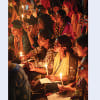
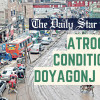
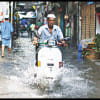
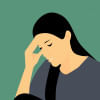
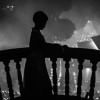


Comments